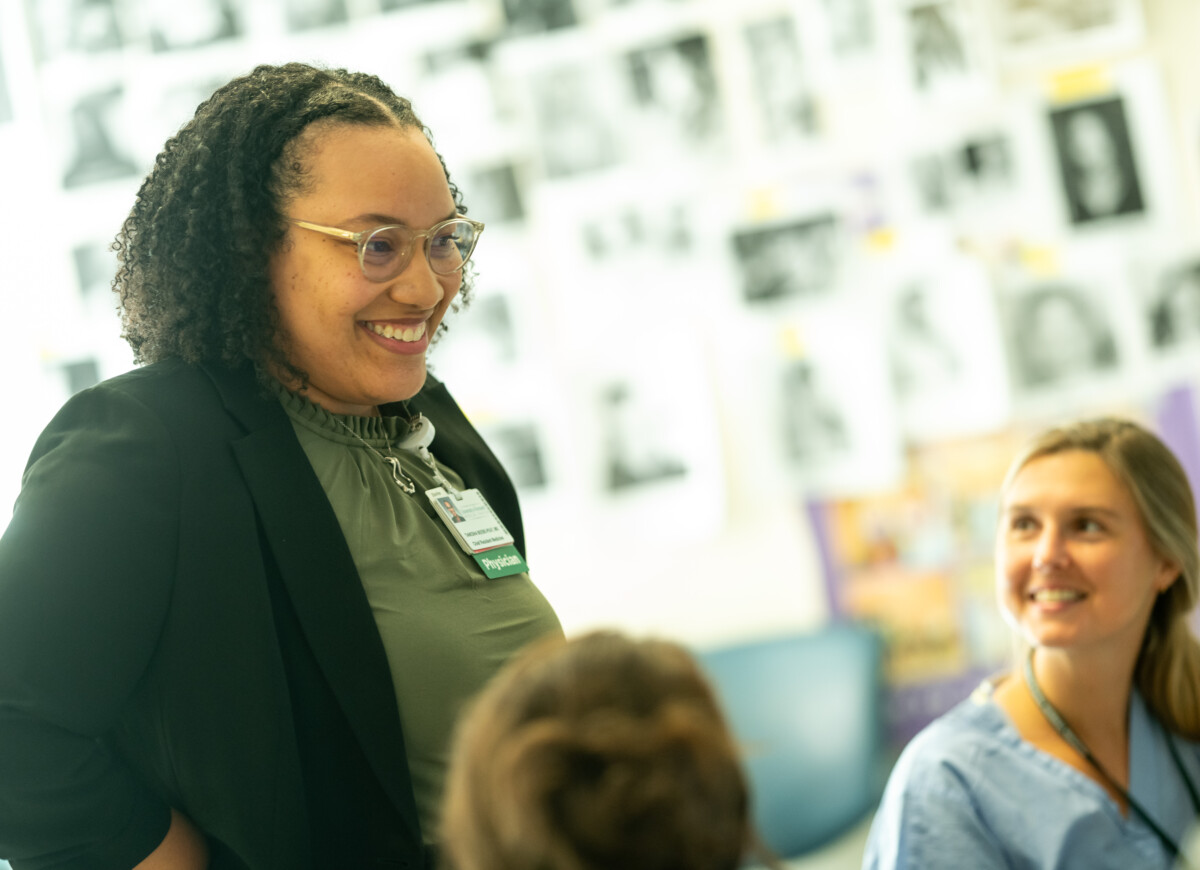Mentorship Program Helps Clinicians and Medical Students Find Community in Vermont

The new mentorship program is partnering medical and nursing students of color with staff and faculty at University of Vermont Medical Center and UVM’s medical and nursing schools to help them benefit from shared experience and strengthen their professional support network.
Medical and nursing school are daunting endeavors under the best of circumstances, but for those students who come from other countries, learned English as a second language or are people of color, the challenges can multiply – particularly when so few peers look like them or share similar cultural traditions.
Anisha Rimal, MD, a pediatric hospitalist at University of Vermont Children’s Hospital, has lived that challenge and wanted to help. The Midwest native grew up in Missouri, went to medical school in Kansas City and completed a fellowship in Minneapolis before coming to work in Vermont with her partner.
“There are pockets of Vermont, in Burlington in particular, that are increasingly diversifying, but the Medical Center, I think, is still behind that trend,” Dr. Rimal says.
Our faculty is still a pretty homogeneous work environment. I sort of struggled with that as a person of color and just trying to find my people. Feeling a sense of affinity was challenging.
Anisha Rimal, MD, pediatric hospitalist at University of Vermont Children’s Hospital
Dr. Rimal was excited to work in the Burlington area with its vibrant Nepali-speaking community – a connection that provided her with a sense of belonging and home.
“I just thought it would be incredible to serve a community for whom we have a shared language,” she says.
Dr. Rimal saw an increasingly diverse group of students at University of Vermont’s Larner College of Medicine, but with few mentors to help them navigate challenges. She thought many students, hailing from more diverse areas, must be experiencing culture shock and could benefit from finding community to share struggles, solutions and offer support based on a shared experience that was not available.
“I’ve spoken to medical students who talked about this and talked about the challenges of being in Vermont during medical school, and that really motivated me to think a little bit more about mentorship and also how positively mentorship had impacted me as a med student and also as a trainee,” she says.
Dr. Rimal soon connected with Miller Celestin, a Haitian-American faculty member in the College of Nursing and Health Sciences. Together they founded a mentorship program called FAM – Finding Affinity and Mentorship. The program matches medical and nursing students of color with staff and faculty at UVM Medical Center and UVM’s medical nursing schools.
“We came together and thought it would be really cool to have a program where we got to do interprofessional work, have medical students be in the same space as nursing students and really learn from each other, figure out what our roles are all about,” Dr. Rimal says. “Just create something joyful.”
First year medical student Rhea Puthumana joined FAM as someone new to Vermont, looking to build a professional network and learn about others’ clinical experiences and how they navigated the lack of diversity in the state. She found that – and more – from mentors and fellow mentees.
In a way, this program built a sense of familiarity and community for me, especially as I transitioned into medical school life in a new environment.
Rhea Puthumana, first year medical student
The mentor program launched in September 2023 and already 65 students are participating with 26 mentors. It groups participants in pods, which helps to create a sense of affinity. The mentors are a broad group, comprised of senior residents and nursing and physician staff and faculty at the hospital and medical and nursing schools. While mentorship programs like FAM exist at other institutions, they rarely combine doctors and nurses.
Tanesha Beebe-Peat, MD, chief resident for internal medicine, serves as a mentor for students. She signed up to feel a stronger sense of connection with other Black staff and students.
It has been such an amazing experience to be part of FAM. Often when connecting with my POD, despite the type of week I had, I felt so happy and energized after every meeting
Tanesha Beebe-Peat, MD, chief resident for internal medicine
The FAM program helped Dr. Beebe-Peat make the decision to remain at UVM Medical Center.
“I am happy to be staying at UVM Medical Center as a cardiology fellow this coming July so I can continue participating in FAM. It is integral to the experience at UVM and UVM Medical Center,” she says.
Simran Kalsi is a fourth-year medical student at Larner, a first-generation college student in the U.S., and the first woman in her family to become a physician. Those attributes inspired her to pass on advice she wishes she had known on her own journey. She says FAM and its unique design connecting mentors and mentees within an interdisciplinary POD was helpful.
“I made new friends, gave and received career advice and learned new lessons about what it’s like to be a woman of color in medicine,” Kalsi says. “I hope it continues to allow multiple generations of students and health care professionals to learn from each other and find inspiration in each other’s experiences.”
